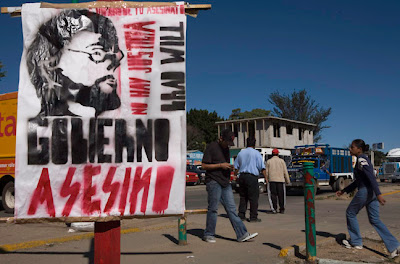Rebel Imports

I struggle every year to make the most of all these really wack holidays. Thankfully, friends like Rebel Imports help me turn the whole consumerist affair into an educational and solidaritous activity --> check out their pitch below and support the Zapatista and Palestinian struggles this "holiday season."
And on this National Day of Mourning, let us take heart in the fact that two adherents to the Zapatistas' Sixth Declaration of the Lacandon Jungle, Movement for Justice in El Barrio (MJB) and the Coalition of Immokalee Workers (CIW), are taking the struggle back to where it came from: England. Yesterday, Anti-Slavery International presented the CIW with their 2007 Anti-Slavery Award. You can check out CIW's exploration of London and slavery here. And in the year to come, MJB will be traveling across the Atlantic to confront East Harlem's most powerful gentrifier, the London-based investment bank Dawnay, Day.
ALSO, for those in NYC!:
--> Come to Carlitos Café on THURSDAY, NOVEMBER 29TH for their closing celebration featuring DJ Liberation sound, Camrade Chris and MC Zuzuka Poderosa who is coming all the way from Brazil. For those that don't know, Carlitos Café and Gallery has been an important pro-Zapatista space in East Harlem since opening its doors in 2003...come out, celebrate, party, and buy some crafts to support the SAVE CARLITOS campaign to find another space.
--> (UPDATE: This event has been CANCELLED. The movie will screen later in the year...) Mark your calendars for SUNDAY, JANUARY 27TH, 2008, when Movement for Justice in El Barrio will be hosting the New York City Premiere of "A Very Big Train Called the Other Campaign," at St. Mark's Church starting at 6p. You can also make a donation to them directly by going here.
Saludos Rebeldes from Rebel Imports!
It's that time of year again, when just about everyone you know expects presents and you find yourself asking, "What do I get for that hard-to-shop-for revolutionary anti-capitalist in my life?" Lucky for you, now you can buy Zapatista-made jewelry, textiles, coffee, and more at www.rebelimports.com.
Who we are
Rebel Imports is a volunteer-run organization that aims to build sustainable fair markets for artisans and farmers, especially those in conflict zones or with connections to social movements. Zapatista women told us that more than charity, they want dignity and fair prices for their artesania... so Rebel Imports was born.
New products
The Xulum Chon cooperative's popular EZLN Book Bags are available in new, fabulous colors like dark blue, purple, orange, and gray.
We've added a lot of exciting clothing, like Nichim Rosa's embroidered skirts, Xulum Chon's embroidered pants, and t-shirts in two designs, Sowing Dignity and Bike Revolution, from Colectivos de Apoyo, Solidaridad, y Accion (CASA, formerly the Chiapas Peace House). Check back soon for new shirts from the Zapatista Rebel Autonomous Secondary School teacher’s collective--they're on their way!
We now have Narco News' first book, Nancy Davies' The People Decide: Oaxaca's Popular Assembly.
We sold out of the Magdalenas de la Paz Collective's ironwork last year, so this year we stocked up on their keychains, hooks (which make great curtain rod holders), and decorative wall hangings. Same goes for the textiles produced by the women in the collective--last year we couldn't keep their intricately-woven change purses and tote bags in stock!
Favorites
Everyone loves Zapatista coffee--in addition to being addictive, it's delicious. For the tea drinkers in your life, Mut Vitz also makes raw coffee flower honey.
Palestinian extra virgin organic olive oil is back! This will be your last chance to get it in the heirloom flip-top glass bottles, while supplies last.
Happy holidays from Rebel Imports!
En solidaridad,
Rebel Imports / Importaciones Rebeldes
http://www.rebelimports.com
Rebel Imports is a member of the ZapaRed Zapatista Network, a network of networks north of the Rio Grande.
Importaciones Rebeldes es miembro de la ZapaRed, una red de redes al norte del Rio Bravo en solidaridad con la lucha zapatista.
Read More!



